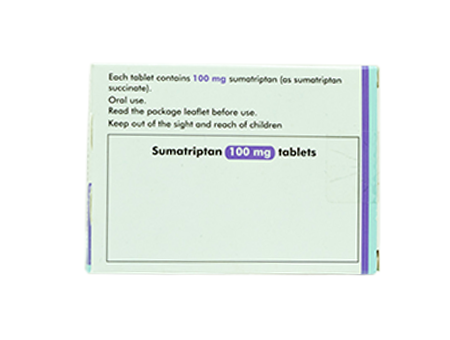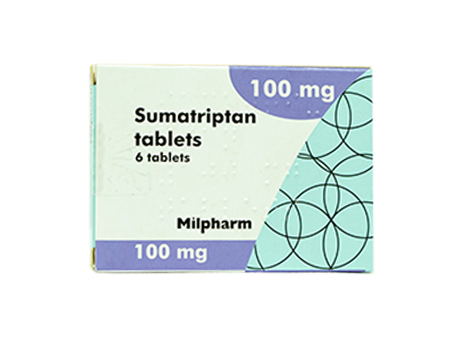Other Options Include
Sumatriptan can manage migraine headaches by providing relief for symptoms associated with migraines such as vomiting, nausea, and sensitivity to sound/light. If you take Sumatriptan at the onset of migraine symptoms, it can offer quick relief so you can get on with your day.
Sumatriptan is a medication of the triptan class. It is believed to work by affecting serotonin, which is a naturally produced chemical that causes the narrowing of the blood vessels in the brain. Sumatriptan helps to minimise the effects of migraine headaches where painkillers and NSAIDs have not worked.
Directions
Before taking Sumatriptan, you are advised to consult with your clinician to establish a correct diagnosis of migraines and to ensure this medication is safe for you to take. Your medical condition and response to the medication will determine your dosage. Your doctor will prescribe you the dose you need to start with. You can take this medication by swallowing it with water, with or without food. Take a single dose as soon as you feel the first signs of an oncoming migraine headache. If this medication provides only partial relief, or if your headache comes back, you can take another dose at least 2 hours after the first dose. However, do not exceed 200 mg in one 24 hour period. If your migraine has not responded to the initial dose then you should not take a second dose for the same attack.You must follow the instructions laid out to you by the prescriber and must not deviate from that. If your condition does not improve thereafter, do not take any more of this medication and refer yourself to a doctor immediately.
Side Effects
The following is a list of possible side effects of Sumatriptan. If any of the given side effects do result for you, and if they persist or get worse, contact your doctor at once.
Raised blood pressure. Regularly check your blood pressure and get urgent medical attention if you have high blood pressure.
Tightness in the neck/chest/jaw, or pain and pressure in those areas. unusual sweating or shortness of breath. Get immediate medical help if you notice these symptoms.
Allergic reactions to Sumatriptan are rare. If you do get an allergic reaction, seek medical attention right away.
Feelings of tingling or numbness, flushing, heat, or feelings of weakness and drowsiness might occur. If you get these symptoms, and they persist or get worse, seek medical attention.
Sumatriptan works by increasing the serotonin level in the brain. A rare side effect of this can be a serious condition called 'serotonin syndrome/toxicity’. The risk of it is increased if you are taking other medications that increase serotonin levels in the brain as well. This is why you must tell your doctor about all the medications you are taking before you start taking Sumatriptan.
Warnings
If you are at risk of heart problems or are overweight, have a high blood pressure, cholesterol or diabetes it is advisable to have a check up with your GP done before taking Sumatriptan. You might also be asked to take your first dose in the doctor's office, so that you have medical supervision in case you develop an adverse reaction to the medication.
Tell your medical practitioner if you have a history of medical conditions, such as diabetes, high cholesterol or high blood pressure, a family history of heart disease, or if you smoke cigarettes. All these factors will have to be taken into account before you start taking Sumatriptan.
Sumatriptan should not be taken for more than 10 days in a 1 month period as this may make your headaches worse. Call your doctor if you are using sumatriptan to treat more than 4 headaches in a 1 month period.
Before taking Sumatriptan, discuss with your doctor any possible allergies you may have. The medication can contain inactive ingredients, which can cause allergic reactions in some people.
Disclose to the doctor your complete medical history, especially if you have, or used to have, any problems with the circulatory system in your stomach, or legs and arms. Also, tell your doctor if you have frequent headaches, heart problems, or any kind of liver issues.
There is limited experience of using sumatriptan during pregnancy; manufacturers advise that it should be avoided unless the potential benefit outweighs the risk. Your doctor can guide you about the risks and benefits of taking this medication while pregnant. Sumatriptan has been found in trace amounts in breast milk so it is advisable for nursing mothers to withhold breastfeeding for at least 12 hours after their last dose. If you are pregnant or breastfeeding then Sumatriptan should only be initiated under the doctors direct supervision.








